| Srl | Item |
| 1 |
ID:
140380
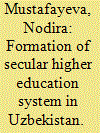

|
|
|
| 2 |
ID:
182540
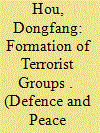

|
|
|
|
|
| Summary/Abstract |
This article investigates the determinants of terrorist group formation. Using a series of negative binomial regressions with both time and country fixed effects, this paper finds that population, state failure, and civil wars are positive determinants of terrorist group formation. Per capita income has an inverted U-shaped relationship with the incubation of terrorist groups, while regime type is not a significant indicator of the establishment of new terrorist groups. This paper contributes to the existing literature by taking the annual number of newly formed terrorist groups as the dependent variable and extending the time frame of previous research with the help of a recently published dataset.
|
|
|
|
|
|
|
|
|
|
|
|
|
|
|
|
| 3 |
ID:
134120
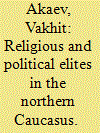

|
|
|
|
|
| Publication |
2014.
|
| Summary/Abstract |
This article highlights the main factors relating to the formation of the religious and political (Islamic) elites in the Northern Caucasus caused by Gorbachev's perestroika, the collapse of the Soviet Union, the reforms conducted in Russia, the creation of an ideological vacuum, and the birth of market relations. The sociocultural context that formed has given rise to an Islamic revival, the penetration of Salafi (Wahhabi) ideas into the region, and the formation of a neo-clergy that is not only claiming a leading role in the religious life of Muslims, but also active participation in politics, right down to preparing a state coup.
|
|
|
|
|
|
|
|
|
|
|
|
|
|
|
|
| 4 |
ID:
141439
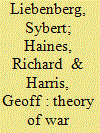

|
|
|
|
|
| Summary/Abstract |
This article presents a proposed theory of how war economies are formed and maintained, as well as an integrated policy framework to guide the dismantling of war economies emanating from the proposed theory. Additionally, six potential areas for future research pertaining to the dismantling of war economies are also presented.
|
|
|
|
|
|
|
|
|
|
|
|
|
|
|
|
| 5 |
ID:
090434
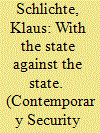

|
|
|
|
|
| Publication |
2009.
|
| Summary/Abstract |
In a world of growing security challenges, non-state armed actors have captured significant attention from scholars concerned with regime stability and the consolidation of national states. But the preoccupation with national political dynamics has eclipsed the study of non-state armed actors who struggle to secure economic dominion, and whose activities reveal alternative networks of power, authority, independence, and self-governance unfolding on a variety of territorial scales both smaller and larger than the nation-state. With a focus on actors as wide-ranging as private police, gangs, and mafias, this article charts the proliferation and significance of non-state armed action structured around economic activities, and assesses the nature of violence and insecurity generated by these activities in comparison to more conventional politically oriented non-state action. Drawing evidence primarily from middle-income countries of the global south, where political regimes are relatively more stable but a wide variety of non-state armed actors still proliferate, it examines the new 'spatiality' of non-armed state action directed toward economic sovereignty, argues that it forms the basis for alternative imagined communities of allegiance, and assesses the implications for the future of the traditional nation-state.
|
|
|
|
|
|
|
|
|
|
|
|
|
|
|
|